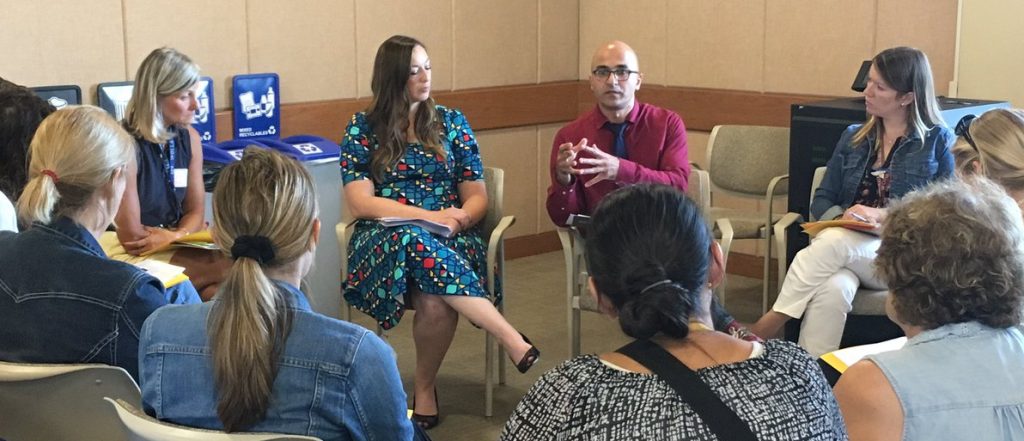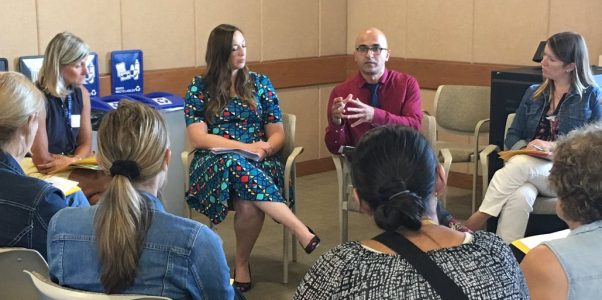
(Designed for Arlington Public Schools)
Effect of Parental Incarceration on Children
This workshop was designed to address the needs of Arlington Public Schools in helping their pre-school teachers to understand the effects of parental incarceration on children so they can support these families as children are prepared to attend school. However, this program could also be given to all teachers as well as children of all ages.
The workshop addressed specific questions that Arlington Public Schools had. They wanted to know the following:
- How parental incarceration affects children
- What teachers should understand about these children
Do children visit their incarcerated parents? If yes, what is that experience like?
- Are there certain times that may be more difficult than others for children of incarcerated parents?
- What can teachers do to support these children emotionally?
- Are there any suggestions as to how teachers can support children if they want to talk about their experiences and feelings?
In this program, Hamed Farmand, founder and president of the non-profit organization, Children of Imprisoned Parents International (COIPI), and Heather Pritchett, Director of Development and Outreach at Offender Aid and Restoration (OAR – Arlington) discussed the above issues and offered recommendations as well as their organizations’ programs and services.
Hamed Farmand talked about himself and his experience. He was born and raised in Iran, Tehran. When he was six, his mother was arrested for political reasons. Hamed emigrated here 6 1/2 years ago. Two years later, he began researching the psychological effects of parental incarceration on children. He began a non-profit organization in 2014 to serve the children of incarcerated parents. COIPI’s mission is to promote, deliver, and sustain evidenced-based prevention and support programs around the world for children who have experienced psychological or physical trauma from growing up in a home with incarcerated parents. COIPI’s programs are educating and providing resources for parents as well as members of the judicial and social services community.
Heather explained that OAR is a community-based restorative justice organization, blending compassion and accountability to assist offenders in leading productive lives to the benefit of all. OAR is located in the front portion of the Arlington jail, and serves families and individuals who are struggling with incarceration.
Hamed continued the program by explaining the psychological, physical and behavioral effects of parental incarceration on children. He mentioned that anxiety and separation anxiety are the most powerful psychological effects of parental incarceration on children, ages 2-6 (the ages of pre-schoolers). Hamed said that anxiety may affect a child’s brain development process, having a long-term effect on the brain and causing emotional and behavioral side effects
.
As Hamed said, heart disease and other health issues can be a part of the physical effects of parental incarceration. He also talked about shame and stigma as behavioral effects of parental incarceration, and explained that violent behavior has been seen in some of children of incarcerated parents. School failure and dropping out of school are other effects. 23 percent of children of incarcerated families are unable to complete their education, compared to all children, 4 percent of whom drop out of school or fail.
Many of these children come from families who are struggling with issues such as poverty and low educational achievement. All these issues are related to one other and, because of them, these families may not be able to cover the cost of their child’s education, health or basic needs.
Hamed said that only 42 percent of state prisoners and 55 percent of federal prisoners have face-to-face visitation. He explained that the lack of visitation can be a function of the cost of transportation, other financial issues, or a family’s belief system. Some families believe children may be affected psychologically and emotionally, so they decide not to have visitation. However, studies show that visitation can enable children to find an appropriate coping style. It also helps children and their incarcerated parents to make better connections after release from prison. Hamed explained that children may be more isolated or show more violent behavior before and after visitations. As Hamed explained, these children may feel guilty and/or angry. They als
o become anxious while visiting their parents due to a visitation area that is not friendly as well as a time limit. Hamed also explained that his research and experience shows that communication with children may help them understand their feelings and better ways to deal with their feelings.
Heather explained OAR’s inmate visitation program. They support families to prepare for visitation, to know their rights, and to understand what they supposed to do during a visitation.
Hamed explained the needs of children of incarcerated parents during special occasions such as Christmas, birthdays, father and mother’s day, and sick days. Hamed said that we tend to look at these events from our own perspectives, and, during special moments, we talk about “normal” families—a father, mother and children–all together. But not all families have this “normal” life. He repeated that to properly address the needs of children of incarcerated parents during special times, we should hear them, understand their feelings, help them to understand their own feelings, accept their feelings even if we can’t accept their reactions, and support them in finding ways to deal with their feelings.

Heather introduced the Christmas Angel project. In this project, OAR receives donations of gifts for children of incarcerated parents and recently released prisoners. Volunteers deliver the gifts to the families’ homes and assist with monetary contributions for postage to mail gifts to families that are out of town. As she explained, children received the gifts with their incarcerated parent’s handwriting so they know that they received it from their parents. Hamed said that it would help them to understand that their incarcerated parent still loves them and wants to have a relationship with them even though they can’t be together at that time. Hamed also said that COIPI has a “story telling” program where he, the author of the book, “Missing Mum,” shares his experience with the children who are having many of the same feelings and experiences. This conveys to them that they are not alone.
At the end of the program, Hamed and Heather passed out their brochures to ensure the audience has enough information for the future.
In this project, a total of 80 teachers learned about the effects of parental incarceration on children as well as the children in military families and those who deal with homelessness. As Kate Graham, Director of Development and Outreach at Arlington Public Schools, said, teachers were so impressed and motivated by our discussion that several kept asking her whether they had children who were affected by incarceration. She also mentioned that the teachers can now start the school year with new perspectives on how to better support these families.
At the end of the workshop, audiences were asked seven (7) questions include rating the presenters, the content of the workshop, the relationship between the content and their job and how much they will refer the workshop to others or they will attend a related workshop.
In general, 80% of the audiences rate the workshop “very good” and 20% rate it “excellent”. When they were asked in details, 60% of the audiences rate the workshop strongly related to their job and they mentioned that they will use the materials in their job. 20% of them also was agree that the materials was related to their job. 90% of the audiences was agree or strongly agree that they will refer the workshop to others and/or they will attend a related workshop in the future. All the audiences was agree and strongly agree that the materials was well organized. And, 80% of the audiences strongly believed that presenters was well prepared for the workshop.
These survey helps us to design the future workshop more powerful and on target.

